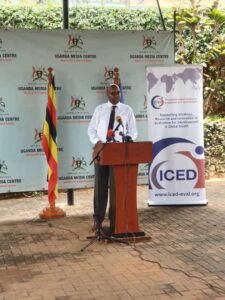By: Joyce Babirye and Kisiriko Vincent
Africa development agenda 2063 is based on grounds that the continent has to cop-up with the emerging development challenges right from food security, technology, price fluctuations of essential commodities, social infrastructure, diseases, and pandemics like Covid19, Ebola, monkey pox outbreaks among other areas, that require strategic research interventions.
Government of Uganda and the International Centre for Evaluation and Development are spearheading this year’s review of different research, policy and broader interventions undertaken by countries on the continent through a thematic and sectoral perspectives as well as in depth discussions on knowledge on brokering and evidence generation.

AC/M&E Emmanuel Turyatunga at the Media Centre briefing the press
During a press conference held at the Uganda Media Centre on 22nd September 2022, Emmanuel Turyatunga, the Assistant Commissioner for Monitoring and Evaluation, said that “This year’s conference is focused on nine key sub themes which include the following:
- COVID-19 responses
- Post COVID-19 recovery and its impact on health,
- Enhancement of agriculture sector
- Development Food systems in Sub Saharan Africa
- Improving adaptation and resilience of private
- Public and individual change makers to climate change and natural resources management
- Innovative finance insurance
- Credit and saving for smaller holders
- Gender equality and youth empowerment in driving Africa’s development, evidence synthesis and impact evaluation for policy-making and good governance,
knowledge brokering and translation under the new normal, effective recovery strategies and inclusion of disadvantaged and vulnerable groups and finally underscoring the role of voluntary professional evaluation society in building debate on leaving no one behind the face of covid19.
Professor David Safo Amegaw the president of the International Centre for Evaluation and Development emphasized that it’s time to nurture the use of evidence-based policy decision making and action in Africa, especially if we are to achieve the targets of the Africa Agenda 2063 and the Agenda 2030 goals with the disruptions of the covid19 pandemic. “The generation and use of evidence-based and relevant policies to support development will lead to individual dignity and wellbeing, flourishing society and a planet earth that is a thriving home for all”, he said.
During the press conference, Josephine Wetara the president of Uganda Evaluation Association, Doctor Damalie Nakanjako the principal for the college of health sciences at Makerere University and Professor Nachwa Shakira form Uganda Evaluators Association called upon young researchers and evaluators to pick interest in this high-level engagement which is a knowledge sharing platform for development.
The event is taking place at Makerere University from the 26th to 30th September 2022 at in Yusuf Lule Central Teaching Facility. Participation is open to the general public at a fee.
Ends.




